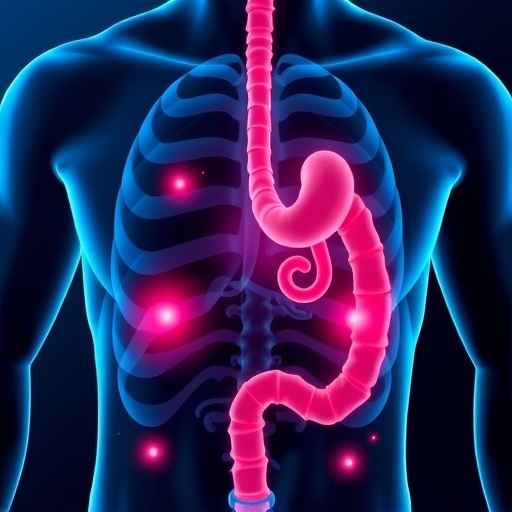Recent research highlights a crucial connection between plasma protein levels and the risk of developing colorectal cancer, one of the leading causes of cancer-related deaths worldwide. According to a study conducted by Pan et al. in 2025, this groundbreaking work employs a proteome-wide Mendelian randomization approach to probe the intricate relationship between various plasma proteins and colorectal cancer risk. The methodology offers a robust lens through which researchers can evaluate the implications of protein variations on cancer susceptibility, a key consideration that could pave the way for novel diagnostic and therapeutic avenues.
The proteomics field has burgeoned in recent years, providing invaluable insights into the myriad proteins that serve as biomarkers for various diseases. Proteins in the plasma act as messengers, reflecting metabolic and pathological changes in the body. By utilizing Mendelian randomization, Pan et al. effectively circumvent the pitfalls of traditional observational studies, leading to more reliable and causative associations between proteins and cancer risk. This approach allows researchers to harness genetic variants that influence plasma protein levels, thereby elucidating the potential direct implications of these proteins on disease development.
The study’s findings indicate that certain plasma proteins are statistically associated with an increased or decreased risk of colorectal cancer. Among the highlighted proteins are those involved in vital physiological processes such as inflammation, cell proliferation, and apoptosis, which are fundamental to cancer pathways. Such insights reinforce the biomedical community’s understanding of the mechanisms through which systemic protein levels can influence cancer pathophysiology, supporting the hypothesis that these proteins may serve as actionable biomarkers.
Mendelian randomization leverages the principles of genetics by using single nucleotide polymorphisms (SNPs) as instrumental variables to assess the impact of modifiable exposures, such as plasma protein levels, on disease outcomes. As the research reveals, variations in certain genes lead to differing levels of protein in the plasma, providing a natural experiment that enhances the reliability of findings often skewed by confounding factors. This methodological rigor is indispensable in painting a clearer picture of the causative relationships in complex diseases like colorectal cancer.
Cancers are known to be influenced by both genetic and environmental factors, making it imperative to distinguish between correlation and causation. Through their meticulous design, the authors of this study present compelling evidence that specific plasma proteins are not mere associations but rather have tangible causal relationships with cancer risk. The implications are profound; if specific proteins can be convincingly linked to colorectal cancer, they might be targeted for preventive measures or act as early diagnostic markers.
The study paves the way for exciting possibilities in the realm of personalized medicine. By identifying individuals with heightened risk based on their plasma protein profiles, healthcare providers can tailor screening strategies and interventions more effectively. This could lead to earlier detection and reduced mortality rates associated with colorectal cancer. Moreover, the standardization of testing for these proteins could streamline clinical practices and foster a new era in cancer management.
Additionally, understanding the plasma proteome’s intricacies creates a fertile ground for therapeutic innovations. If certain proteins are validated as therapeutic targets, future treatments could aim to modulate their levels or functions within the body. Such targeted therapies would move us away from one-size-fits-all approaches and towards individualized treatments that correspond to the unique protein signatures of each patient.
The implications aren’t just limited to colorectal cancer; insights gleaned from this study may resonate across various malignancies. By establishing a clearer understanding of protein-disease relationships, the cancer research community may discover similar associations in other cancers, thereby catalyzing a broader engagement with plasma proteomics in oncological research.
Future studies are necessary to validate these findings in diversified populations and examine the biological mechanisms underlying these observed associations more deeply. Furthermore, additional research could explore how lifestyle factors and environmental exposures interact with plasma protein levels to modulate cancer risk. Unraveling these complexities could reveal multi-faceted approaches to cancer prevention and management.
As the scientific community grapples with rising cancer incidence rates globally, discoveries like those reported by Pan et al. signal a turning point. The intersection of proteomics and cancer research holds unprecedented promise, urging scientists to delve deeper into this uncharted territory. As new therapeutic strategies emerge and the molecular underpinnings of diseases become clearer, the mission remains: to alleviate the burden of cancer through innovative, data-driven solutions in healthcare.
In conclusion, the study conducted by Pan et al. serves as a testament to the powerful intersection of genomics and proteomics in understanding diseases at a molecular level, particularly colorectal cancer. With their findings, they reinforce the idea that plasma proteins could not only be critical for risk assessment but also potential activators for future interventions. It’s through such pioneering research that we may indeed look forward to a future where colorectal cancer is significantly better managed, if not eradicated altogether.
Subject of Research: The associations of plasma protein levels with colorectal cancer risk through a proteome-wide Mendelian randomization study.
Article Title: Associations of plasma protein levels with risk of colorectal cancer: a proteome-wide Mendelian randomization study.
Article References:
Pan, ZK., Wu, MH., Shi, H. et al. Associations of plasma protein levels with risk of colorectal cancer: a proteome-wide Mendelian randomization study.
Clin Proteom 22, 24 (2025). https://doi.org/10.1186/s12014-025-09545-5
Image Credits: AI Generated
DOI: 10.1186/s12014-025-09545-5
Keywords: Plasma Proteins, Colorectal Cancer, Mendelian Randomization, Biomarkers, Proteomics, Personalized Medicine, Therapeutic Targets, Cancer Risk, Early Diagnosis




